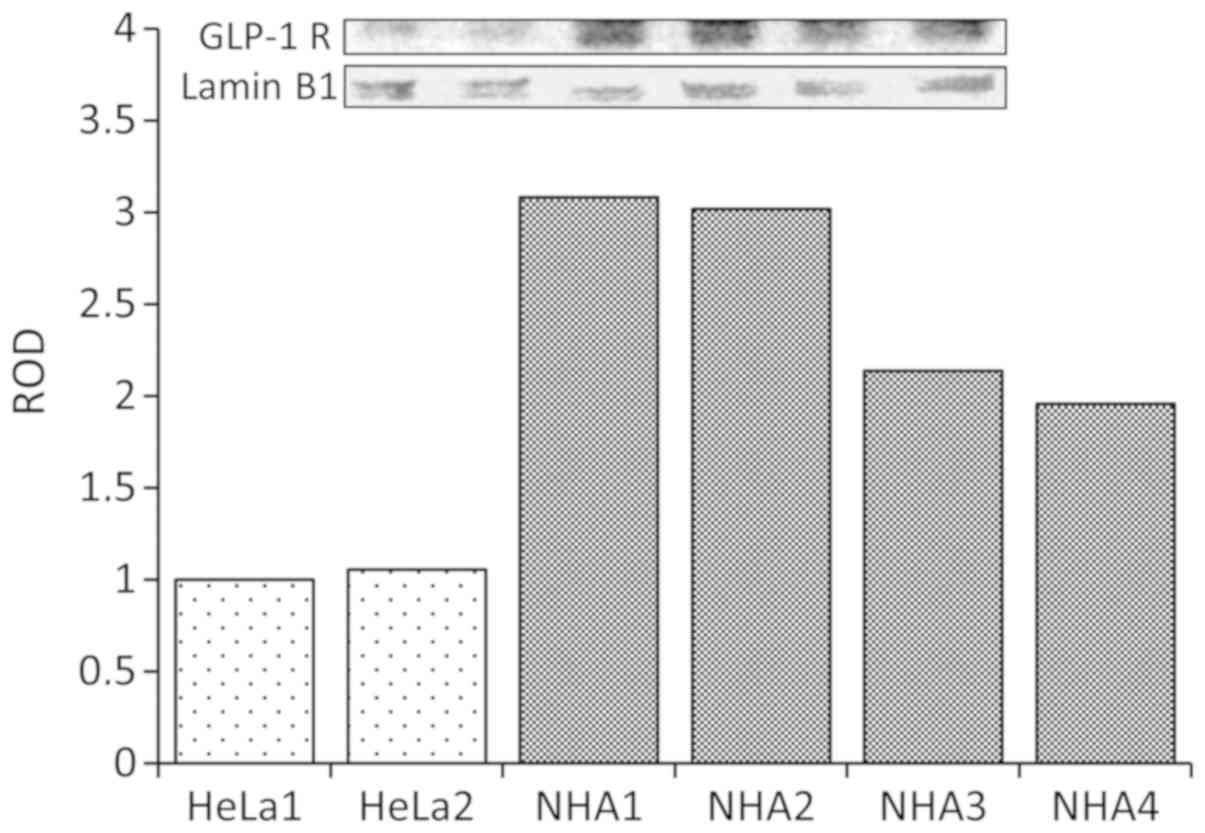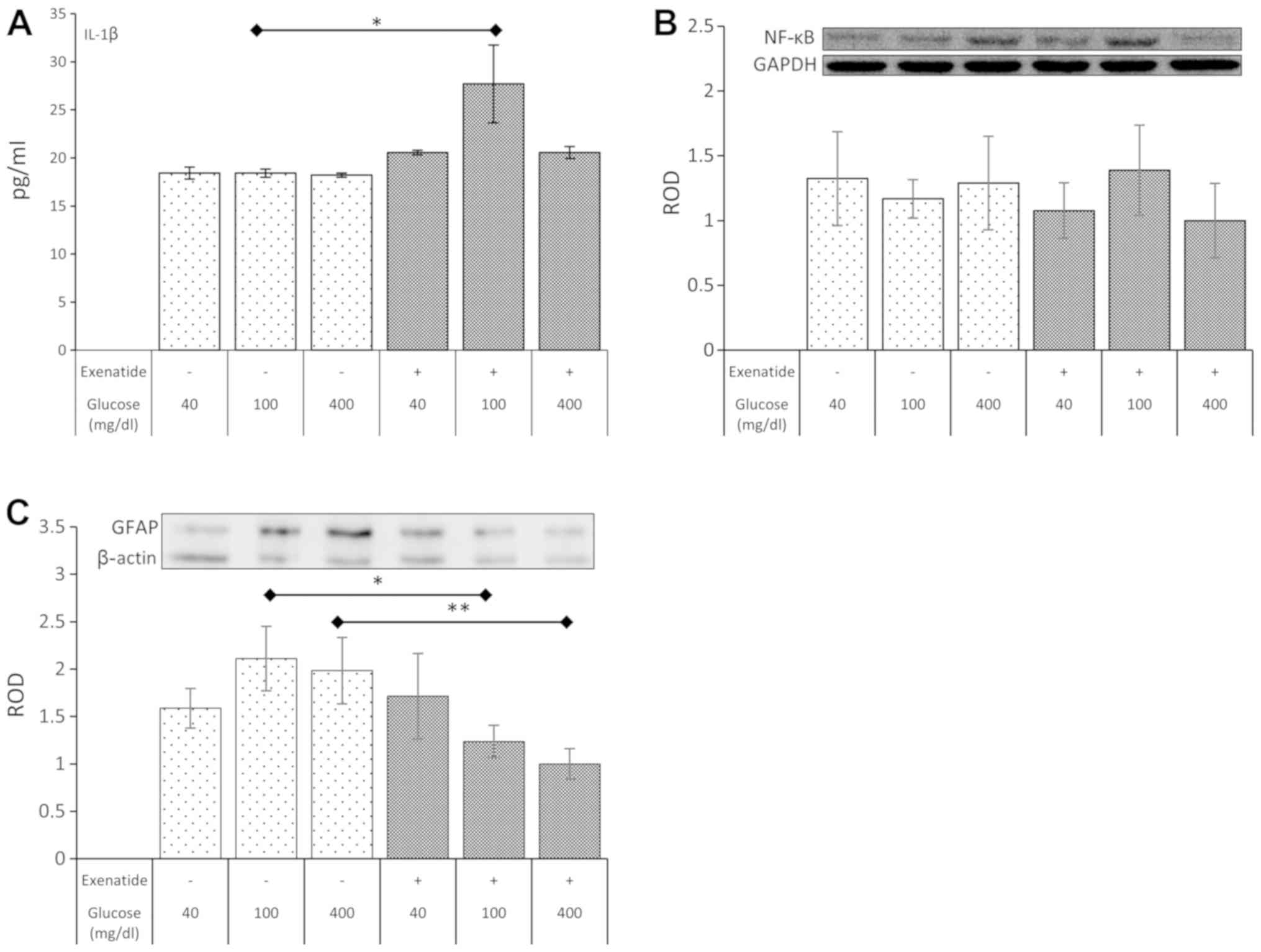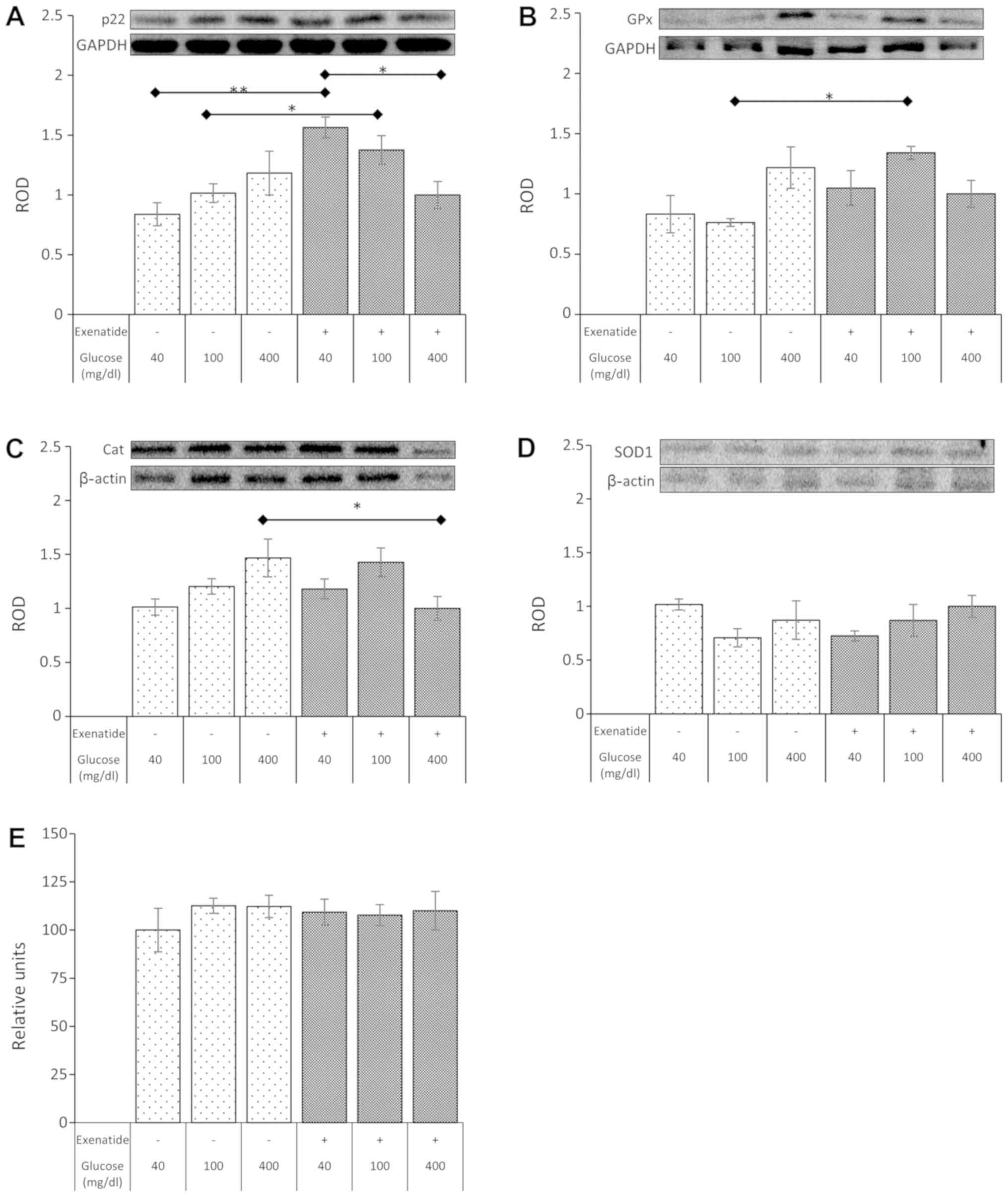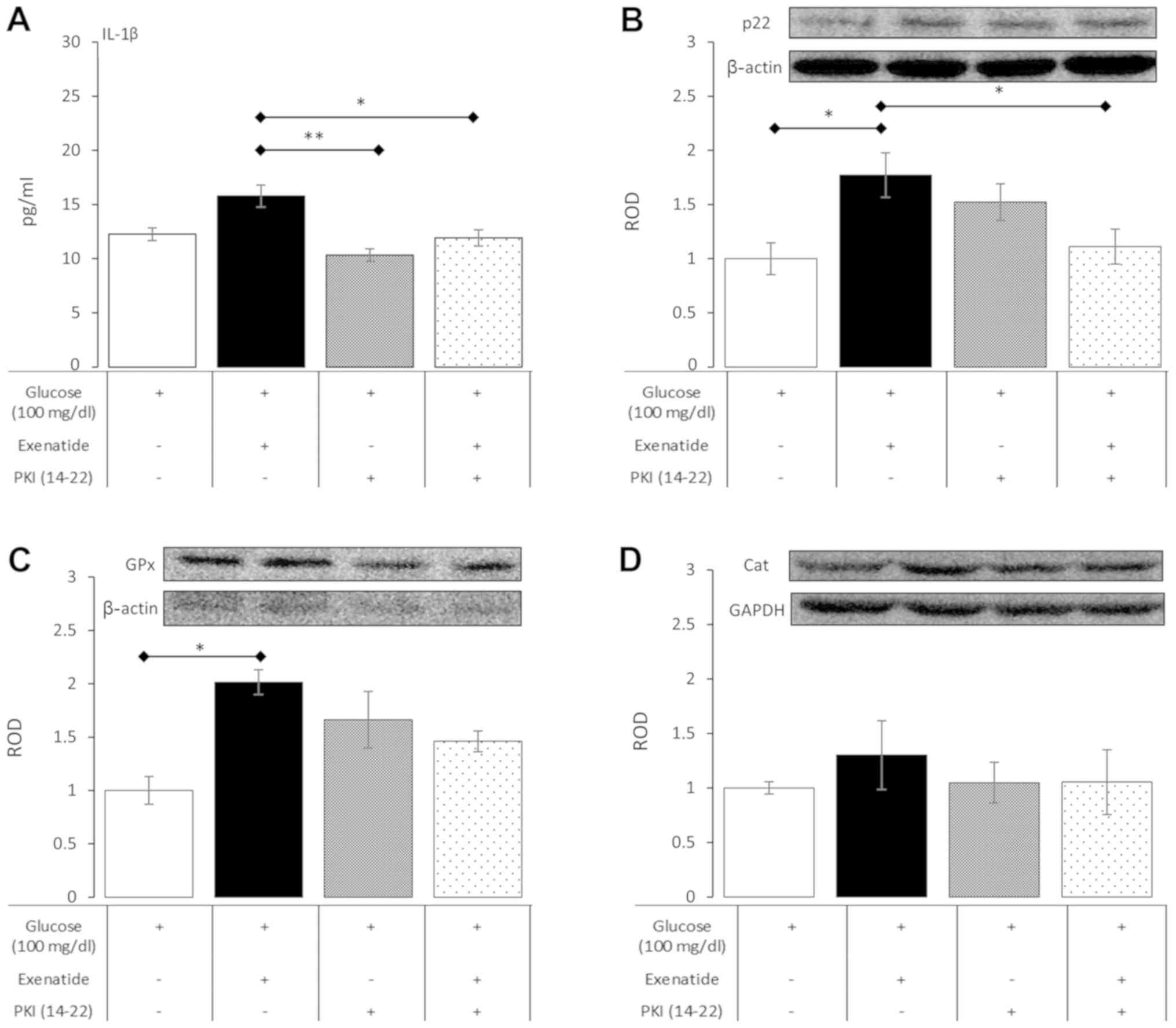|
1
|
Le Magueresse-Battistoni B, Labaronne E,
Vidal H and Naville D: Endocrine disrupting chemicals in mixture
and obesity, diabetes and related metabolic disorders. World J Biol
Chem. 8:108–119. 2017. View Article : Google Scholar : PubMed/NCBI
|
|
2
|
Kaul S: Mitigating cardiovascular risk in
type 2 diabetes with antidiabetes drugs: A review of principal
cardiovascular outcome results of EMPA-REG OUTCOME, LEADER, and
SUSTAIN-6 trials. Diabetes Care. 40:821–831. 2017. View Article : Google Scholar : PubMed/NCBI
|
|
3
|
Andersen A, Lund A, Knop FK and Vilsbøll
T: Glucagon-like peptide 1 in health and disease. Nat Rev
Endocrinol. 14:390–403. 2018. View Article : Google Scholar : PubMed/NCBI
|
|
4
|
Santilli F, Simeone PG, Guagnano MT, Leo
M, Maccarone MT, Di Castelnuovo A, Sborgia C, Bonadonna RC,
Angelucci E, Federico V, et al: Effects of liraglutide on weight
loss, fat distribution, and β-cell function in obese subjects with
prediabetes or early type 2 diabetes. Diabetes Care. 40:1556–1564.
2017. View Article : Google Scholar : PubMed/NCBI
|
|
5
|
Astrup A, Carraro R, Finer N, Harper A,
Kunesova M, Lean ME, Niskanen L, Rasmussen MF, Rissanen A, Rössner
S, et al: Safety, tolerability and sustained weight loss over 2
years with the once-daily human GLP-1 analog, liraglutide. Int J
Obes (Lond). 36:843–854. 2012. View Article : Google Scholar : PubMed/NCBI
|
|
6
|
Nuffer WA and Trujillo JM: Liraglutide: A
new option for the treatment of obesity. Pharmacotherapy.
35:926–934. 2015. View Article : Google Scholar : PubMed/NCBI
|
|
7
|
Martin-Jiménez CA, Gaitán-Vaca DM,
Echeverria V, González J and Barreto GE: Relationship between
obesity, Alzheimer's disease, and Parkinson's disease: An
astrocentric view. Mol Neurobiol. 54:7096–7115. 2017. View Article : Google Scholar : PubMed/NCBI
|
|
8
|
Grill HJ and Hayes MR: The nucleus tractus
solitarius: A portal for visceral afferent signal processing,
energy status assessment and integration of their combined effects
on food intake. Int J Obes (Lond). 33 (Suppl 1):S11–S15. 2009.
View Article : Google Scholar : PubMed/NCBI
|
|
9
|
Croft W, Dobson KL and Bellamy TC:
Plasticity of neuron-glial transmission: Equipping glia for
long-term integration of network activity. Neural Plast.
2015:7657922015. View Article : Google Scholar : PubMed/NCBI
|
|
10
|
Zhao Z, Nelson AR, Betsholtz C and
Zlokovic BV: Establishment and dysfunction of the blood-brain
barrier. Cell. 163:1064–1078. 2015. View Article : Google Scholar : PubMed/NCBI
|
|
11
|
Buckman LB, Thompson MM, Moreno HN and
Ellacott KL: Regional astrogliosis in the mouse hypothalamus in
response to obesity. J Comp Neurol. 521:1322–1333. 2013. View Article : Google Scholar : PubMed/NCBI
|
|
12
|
Moretti R, Pansiot J, Bettati D,
Strazielle N, Ghersi-Egea JF, Damante G, Fleiss B, Titomanlio L and
Gressens P: Blood-brain barrier dysfunction in disorders of the
developing brain. Front Neurosci. 9:402015. View Article : Google Scholar : PubMed/NCBI
|
|
13
|
de Git KC and Adan RH: Leptin resistance
in diet-induced obesity: The role of hypothalamic inflammation.
Obes Rev. 16:207–224. 2015. View Article : Google Scholar : PubMed/NCBI
|
|
14
|
García MC, Wernstedt I, Berndtsson A, Enge
M, Bell M, Hultgren O, Horn M, Ahrén B, Enerback S, Ohlsson C, et
al: Mature-onset obesity in interleukin-1 receptor I knockout mice.
Diabetes. 55:1205–1213. 2006. View Article : Google Scholar : PubMed/NCBI
|
|
15
|
Boyer F, Vidot JB, Dubourg AG, Rondeau P,
Essop MF and Bourdon E: Oxidative stress and adipocyte biology:
Focus on the role of AGEs. Oxid Med Cell Longev. 2015:5348732015.
View Article : Google Scholar : PubMed/NCBI
|
|
16
|
Dossi E, Vasile F and Rouach N: Human
astrocytes in the diseased brain. Brain Res Bull. 136:139–156.
2018. View Article : Google Scholar : PubMed/NCBI
|
|
17
|
Chowen JA, Argente-Arizón P,
Freire-Regatillo A, Frago LM, Horvath TL and Argente J: The role of
astrocytes in the hypothalamic response and adaptation to metabolic
signals. Prog Neurobiol. 144:68–87. 2016. View Article : Google Scholar : PubMed/NCBI
|
|
18
|
Chowen JA, Argente J and Horvath TL:
Uncovering novel roles of nonneuronal cells in body weight
homeostasis and obesity. Endocrinology. 154:3001–3007. 2013.
View Article : Google Scholar : PubMed/NCBI
|
|
19
|
Thaler JP, Yi CX, Schur EA, Guyenet SJ,
Hwang BH, Dietrich MO, Zhao X, Sarruf DA, Izgur V, Maravilla KR, et
al: Obesity is associated with hypothalamic injury in rodents and
humans. J Clin Invest. 122:153–162. 2012. View Article : Google Scholar : PubMed/NCBI
|
|
20
|
Papouin T, Dunphy J, Tolman M, Foley JC
and Haydon PG: Astrocytic control of synaptic function. Philos
Trans R Soc Lond B Biol Sci. 372(pii): 201601542017. View Article : Google Scholar : PubMed/NCBI
|
|
21
|
Huang HJ, Chen YH, Liang KC, Jheng YS,
Jhao JJ, Su MT, Lee-Chen GJ and Hsieh-Li HM: Exendin-4 protected
against cognitive dysfunction in hyperglycemic mice receiving an
intrahippocampal lipopolysaccharide injection. PLoS One.
7:e396562012. View Article : Google Scholar : PubMed/NCBI
|
|
22
|
Reiner DJ, Mietlicki-Baase EG, McGrath LE,
Zimmer DJ, Bence KK, Sousa GL, Konanur VR, Krawczyk J, Burk DH,
Kanoski SE, et al: Astrocytes regulate GLP-1 receptor-mediated
effects on energy balance. J Neurosci. 36:3531–3540. 2016.
View Article : Google Scholar : PubMed/NCBI
|
|
23
|
Gullo F, Ceriani M, D'Aloia A, Wanke E,
Constanti A, Costa B and Lecchi M: Plant polyphenols and exendin-4
prevent hyperactivity and TNF-α release in LPS-treated in vitro
neuron/astrocyte/microglial networks. Front Neurosci. 11:5002017.
View Article : Google Scholar : PubMed/NCBI
|
|
24
|
Bao Y, Jiang L, Chen H, Zou J, Liu Z and
Shi Y: The neuroprotective effect of liraglutide is mediated by
glucagon-like peptide 1 receptor-mediated activation of
cAMP/PKA/CREB pathway. Cell Physiol Biochem. 36:2366–2378. 2015.
View Article : Google Scholar : PubMed/NCBI
|
|
25
|
Lee YS and Jun HS: Anti-inflammatory
effects of GLP-1-based therapies beyond glucose control. Mediators
Inflamm. 2016:30946422016. View Article : Google Scholar : PubMed/NCBI
|
|
26
|
Vinet L, Lamprianou S, Babič A, Lange N,
Thorel F, Herrera PL, Montet X and Meda P: Targeting GLP-1
receptors for repeated magnetic resonance imaging differentiates
graded losses of pancreatic beta cells in mice. Diabetologia.
58:304–312. 2015. View Article : Google Scholar : PubMed/NCBI
|
|
27
|
Czekanska EM: Assessment of cell
proliferation with resazurin-based fluorescent dye. Methods Mol
Biol. 740:27–32. 2011. View Article : Google Scholar : PubMed/NCBI
|
|
28
|
Nitti M, Furfaro AL, Traverso N, Odetti P,
Storace D, Cottalasso D, Pronzato MA, Marinari UM and Domenicotti
C: PKC delta and NADPH oxidase in AGE-induced neuronal death.
Neurosci Lett. 416:261–265. 2007. View Article : Google Scholar : PubMed/NCBI
|
|
29
|
Douglass JD, Dorfman MD and Thaler JP:
Glia: Silent partners in energy homeostasis and obesity
pathogenesis. Diabetologia. 60:226–236. 2017. View Article : Google Scholar : PubMed/NCBI
|
|
30
|
Etchegoyen M, Nobile MH, Baez F,
Posesorski B, González J, Lago N, Milei J and Otero-Losada M:
Metabolic syndrome and neuroprotection. Front Neurosci. 12:1962018.
View Article : Google Scholar : PubMed/NCBI
|
|
31
|
Bułdak Ł, Machnik G, Bułdak RJ, Łabuzek K,
Bołdys A, Belowski D, Basiak M and Okopień B: Exenatide (a GLP-1
agonist) expresses anti-inflammatory properties in cultured human
monocytes/macrophages in a protein kinase A and B/Akt manner.
Pharmacol Rep. 68:329–337. 2016. View Article : Google Scholar : PubMed/NCBI
|
|
32
|
Bułdak Ł, Machnik G, Bułdak RJ, Łabuzek K,
Bołdys A and Okopień B: Exenatide and metformin express their
anti-inflammatory effects on human monocytes/macrophages by the
attenuation of MAPKs and NFκB signaling. Naunyn Schmiedebergs Arch
Pharmacol. 389:1103–1115. 2016. View Article : Google Scholar : PubMed/NCBI
|
|
33
|
Iwai T, Ito S, Tanimitsu K, Udagawa S and
Oka J: Glucagon-like peptide-1 inhibits LPS-induced IL-1beta
production in cultured rat astrocytes. Neurosci Res. 55:352–360.
2006. View Article : Google Scholar : PubMed/NCBI
|
|
34
|
Shirazi R, Palsdottir V, Collander J,
Anesten F, Vogel H, Langlet F, Jaschke A, Schürmann A, Prévot V,
Shao R, et al: Glucagon-like peptide 1 receptor induced suppression
of food intake, and body weight is mediated by central IL-1 and
IL-6. Proc Natl Acad Sci USA. 110:16199–16204. 2013. View Article : Google Scholar : PubMed/NCBI
|
|
35
|
Schéle E, Benrick A, Grahnemo L, Egecioglu
E, Anesten F, Pálsdóttir V and Jansson JO: Inter-relation between
interleukin (IL)-1, IL-6 and body fat regulating circuits of the
hypothalamic arcuate nucleus. J Neuroendocrinol. 25:580–589. 2013.
View Article : Google Scholar : PubMed/NCBI
|
|
36
|
Wang J, Li G, Wang Z, Zhang X, Yao L, Wang
F, Liu S, Yin J, Ling EA, Wang L and Hao A: High glucose-induced
expression of inflammatory cytokines and reactive oxygen species in
cultured astrocytes. Neuroscience. 202:58–68. 2012. View Article : Google Scholar : PubMed/NCBI
|
|
37
|
Liu Y, Biarnés Costa M and Gerhardinger C:
IL-1β is upregulated in the diabetic retina and retinal vessels:
cell-specific effect of high glucose and IL-1β autostimulation.
PLoS One. 7:e369492012. View Article : Google Scholar : PubMed/NCBI
|
|
38
|
Varga ZV, Giricz Z, Liaudet L and Haskó G:
Ferdinandy P and Pacher P: Interplay of oxidative,
nitrosative/nitrative stress, inflammation, cell death and
autophagy in diabetic cardiomyopathy. Biochim Biophys Acta.
1852:232–242. 2015. View Article : Google Scholar : PubMed/NCBI
|
|
39
|
He L, Wong CK, Cheung KK, Yau HC, Fu A,
Zhao HL, Leung KM, Kong AP, Wong GW, Chan PK, et al:
Anti-inflammatory effects of exendin-4, a glucagon-like peptide-1
analog, on human peripheral lymphocytes in patients with type 2
diabetes. J Diabetes Investig. 4:382–392. 2013. View Article : Google Scholar : PubMed/NCBI
|
|
40
|
Nerurkar PV, Johns LM, Buesa LM, Kipyakwai
G, Volper E, Sato R, Shah P, Feher D, Williams PG and Nerurkar VR:
Momordica charantia (bitter melon) attenuates high-fat
diet-associated oxidative stress and neuroinflammation. J
Neuroinflammation. 8:642011. View Article : Google Scholar : PubMed/NCBI
|
|
41
|
Martin-Jiménez CA, García-Vega Á, Cabezas
R, Aliev G, Echeverria V, González J and Barreto GE: Astrocytes and
endoplasmic reticulum stress: A bridge between obesity and
neurodegenerative diseases. Prog Neurobiol. 158:45–68. 2017.
View Article : Google Scholar : PubMed/NCBI
|
|
42
|
Tanaka J, Toku K, Zhang B, Ishihara K,
Sakanaka M and Maeda N: Astrocytes prevent neuronal death induced
by reactive oxygen and nitrogen species. Glia. 28:85–96. 1999.
View Article : Google Scholar : PubMed/NCBI
|
|
43
|
Maragakis NJ and Rothstein JD: Mechanisms
of disease: Astrocytes in neurodegenerative disease. Nat Clin Pract
Neurol. 2:679–689. 2006. View Article : Google Scholar : PubMed/NCBI
|
|
44
|
Jang EY, Ryu YH, Lee BH, Chang SC, Yeo MJ,
Kim SH, Folsom RJ, Schilaty ND, Kim KJ, Yang CH, et al: Involvement
of reactive oxygen species in cocaine-taking behaviors in rats.
Addict Biol. 20:663–675. 2015. View Article : Google Scholar : PubMed/NCBI
|
|
45
|
Abdelwahed OM, Tork OM, Gamal El Din MM,
Rashed L and Zickri M: Effect of glucagon-like peptide-1 analogue;
Exendin-4, on cognitive functions in type 2 diabetes mellitus;
possible modulation of brain derived neurotrophic factor and brain
Visfatin. Brain Res Bull. 139:67–80. 2018. View Article : Google Scholar : PubMed/NCBI
|
|
46
|
Chang G, Liu J, Qin S, Jiang Y, Zhang P,
Yu H, Lu K, Zhang N, Cao L, Wang Y, et al: Cardioprotection by
exenatide: A novel mechanism via improving mitochondrial function
involving the GLP-1 receptor/cAMP/PKA pathway. Int J Mol Med.
41:1693–1703. 2018.PubMed/NCBI
|
|
47
|
Kim S, Jeong J, Jung HS, Kim B, Kim YE,
Lim DS, Kim SD and Song YS: Anti-inflammatory effect of glucagon
like peptide-1 receptor agonist, exendin-4, through modulation of
IB1/JIP1 expression and JNK signaling in stroke. Exp Neurobiol.
26:227–239. 2017. View Article : Google Scholar : PubMed/NCBI
|
|
48
|
Bułdak Ł, Łabuzek K, Bułdak RJ, Machnik G,
Bołdys A and Okopień B: Exenatide (a GLP-1 agonist) improves the
antioxidative potential of in vitro cultured human
monocytes/macrophages. Naunyn Schmiedebergs Arch Pharmacol.
388:905–919. 2015. View Article : Google Scholar : PubMed/NCBI
|


















